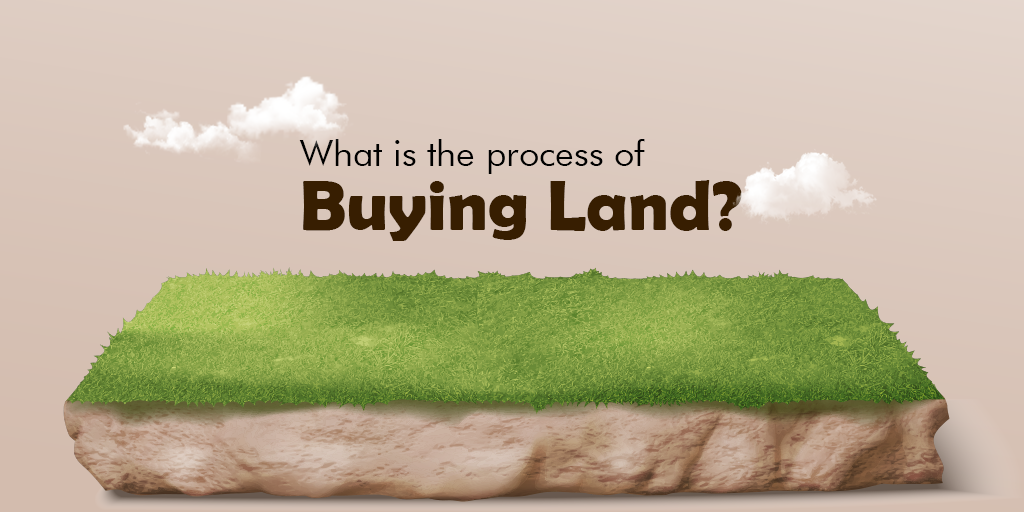Process of Buying Land- We’ve already spoken about why purchasing land is a particularly wise investment and why doing so is better than buying stocks or real estate.
When you make the decision to purchase a piece of land since your ideal house doesn’t yet exist, you have no other option than to build it from scratch.
Before you start thinking about building a foundation, keep in mind that buying land may come with more surprises than buying a house; from easements and zoning restrictions to environmental factors that could easily turn your dream build into a hazard, there are a few things you should be cautious about.
Table of Contents
What is an ideal process of buying land?
Step 1:
Explore the available land for sale: The chances that you find the land that is perfect investment opportunity for you are very rare.
Try conducting an internet search if you are sure that you want to purchase land but do not currently have any particular properties in mind.
Landsale4u is a one-stop website that provides a variety of land solutions that match your needs and financial constraints.
Among the properties listed on Landsale4u are:
- Vacant Land
- Raw Land
- Farm Land
- Residential Lots
- Commercial Lots
- Industrial Sites
- Acreage
If you’d want assistance narrowing down the options to find a match that meets your precise specifications, get in touch with our team of professionals, who will compile a list of your requirements and provide you with suitable land options.
Step 2:
Look for all the factors before finalizing the land: The appropriateness of a piece of land for your particular purposes as well as the difficulty and cost of constructing it may be determined by a number of variables. Before purchasing land, you must take the following into account:
Utility Access: How easily accessible are utilities like water, electricity, internet, etc. in the region where you intend to buy land?
Road Access: It’s crucial to determine whether the property you are choosing has access to either public or private roads.
Zoning Restrictions: Research the zoning and any potential restrictions on the property you’re considering purchasing before signing any documents.
Every piece of land has a designated use zone, such as residential, business, or agricultural. Different sets of regulations are developed by zoning commissioners for certain counties or cities for each categorization.
This will specify what you can and can’t construct on the property. Before contacting the local planning or zoning authority, check our website to see if any zoning maps are available.
Step 3:
Prepare your finances.
You should prepare a few documents since you intend to make a cash/financing offer. You can get the property you want in one of two ways:
Cash: If you choose the cash option, the seller will ask for proof of money. It is an important document as the seller would want to have an insight into the ability to pay the down payment and closing charges.
The institution where your money is kept must issue an official letterhead as proof of your funds. The amount of the account should be provided together with the date and the account holder’s name.
Other forms of proof of funds paperwork that a seller could accept are:
A bank statement
A copy of the balance of a money market account
A line of credit with open equity
Mortgage: There are multiple options if you opt for financing your house:
Acquiring land to construct a house: It’s advisable to find out whether you can get approved for a construction-to-permanent loan first if you want to buy the property and then build a house on it or purchase a modular or mobile home.
A land purchase with utilities: The financing is probably simple if you’re purchasing a plot of property with utilities already installed on it and want to reside there. To qualify for a construction-to-permanent (CP) or combined construction loan to pay for the property and the construction of your home, however, you may need to have building designs in hand.
Step 4:
Submit the bid offer to the seller: After selecting the desired home, you must make the seller a written offer. The preparation and submission of the required documentation, including a Bid Offer form, will be handled by your real estate agent if you are working with one.
If you’re not employing a real estate agent, Landsale4u advises speaking with a real estate lawyer who can help you with negotiating terms and preparing the required paperwork.
Step 5:
Your Land Purchase Agreement Must Be Completed: You must formally close on the property acquisition before you may claim a plot of land as your own. You must consent to this by signing a land purchase contract.
This contract will outline the price you’re paying for the land and the down payment. The contract must also be signed by the seller. Everything between you and the seller regarding the land transaction will be outlined in the land contract that you will sign.
Purchasing land is not an easy process.
It’s crucial to do research and consult professionals and specialists.
Make purchasing land simpler than ever by getting in touch with Landsale4u.
Visit www.landsale4u.com for more information.

